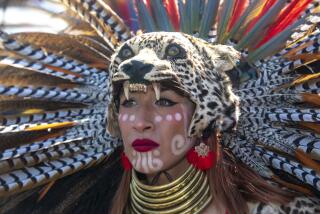The Seven Lively Rules : Principles of Kwanzaa Underlie the African American Festival
SANTA ANA — Even if his 4-year-old daughter didn’t quite get it, E.T. Gainers felt it important to bring her to the 1995 Kwanzaa festival--a celebration of African American history and culture.
“I’m pretty sure she has no idea what any of this is all about,” said Gainers, 35, of Mission Viejo, as he escorted his daughter, Caitlyn, into the festival at the Bowers Museum of Cultural Arts, just one of several Orange County events commemorating the holiday.
“But when I was growing up we never had anything like this,” Gainers said. “I want to give her a good sense of self, a little knowledge about herself. That’s something I desperately lacked growing up.”
The Gainers joined nearly 200 others Saturday for a spirited ceremony sponsored by the African Cultural Arts Council that included a drummers band made up of female religious leaders and a captivating storyteller who brought many audience members to tears with a tale of human triumph.
But the heart of the ceremony was the ritual lighting of seven candles, each representing one of the several principles of Kwanzaa, a Swahili word meaning “first fruits of the harvest.”
The nonreligious, nonpolitical holiday celebrates family, community and African American culture. Traditionally, a candle is lit for each of seven days from Dec. 26 to Jan. 1.
Participants spoke about the significance of the principles--unity, self-determination, collective work and responsibility, cooperative economics, purpose, creativity and, most important of all, faith.
“That’s really the key to all of this, the principles,” said Willia J. Edmonds, who wore traditional African garb as she hosted the ceremony. “We want people to walk away from this learning how they can incorporate the principles into their everyday lives.”
It is hoped the principles will encourage followers to lead a fulfilling and productive life and encourage them to consider their community as their family, Edmonds said.
Randall Jordan, who produces the only black-oriented publication in Orange County, the Black Orange, described the commemoration as the outgrowth of evolving African American pride.
“I want you to be proud of the fact we are a community with a culture,” Jordan told the crowd. “We must have faith in ourselves.”
Participants were quick to remind the audience that Kwanzaa is not intended to replace Christmas, and people of all backgrounds are encouraged to participate.
Although the majority of participants were African Americans, several were not, including Rob Cole, a Whittier contractor, who attended with his girlfriend.
“It’s been a learning experience,” Cole said. “The principles are very intense.”
More to Read
Sign up for Essential California
The most important California stories and recommendations in your inbox every morning.
You may occasionally receive promotional content from the Los Angeles Times.











